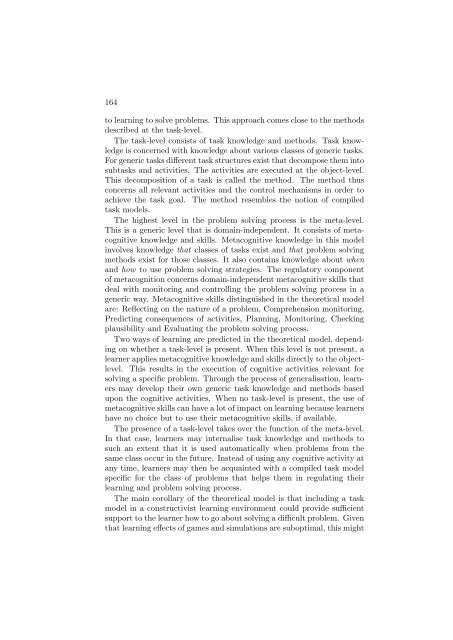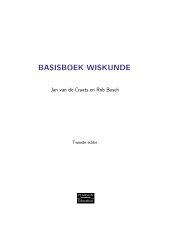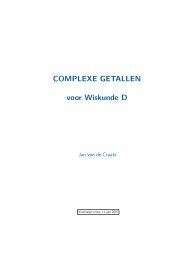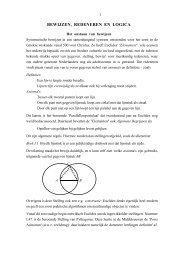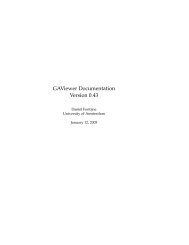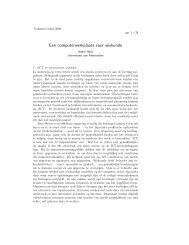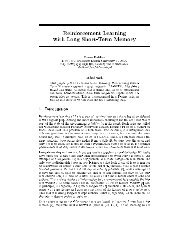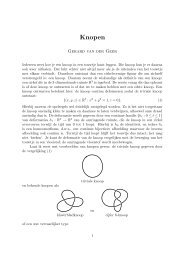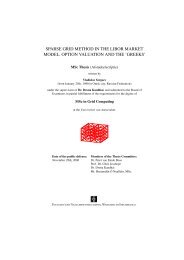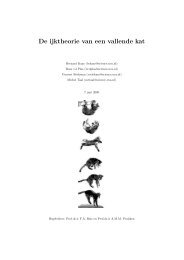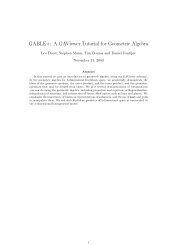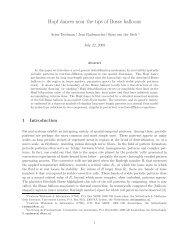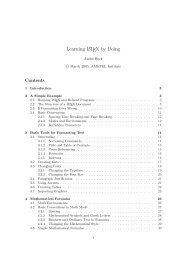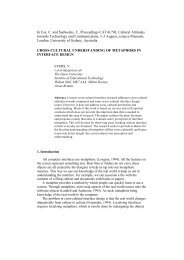The role of metacognitive skills in learning to solve problems
The role of metacognitive skills in learning to solve problems
The role of metacognitive skills in learning to solve problems
Create successful ePaper yourself
Turn your PDF publications into a flip-book with our unique Google optimized e-Paper software.
164<br />
<strong>to</strong> learn<strong>in</strong>g <strong>to</strong> <strong>solve</strong> <strong>problems</strong>. This approach comes close <strong>to</strong> the methods<br />
described at the task-level.<br />
<strong>The</strong> task-level consists <strong>of</strong> task knowledge and methods. Task knowledge<br />
is concerned with knowledge about various classes <strong>of</strong> generic tasks.<br />
For generic tasks different task structures exist that decompose them <strong>in</strong><strong>to</strong><br />
subtasks and activities. <strong>The</strong> activities are executed at the object-level.<br />
This decomposition <strong>of</strong> a task is called the method. <strong>The</strong> method thus<br />
concerns all relevant activities and the control mechanisms <strong>in</strong> order <strong>to</strong><br />
achieve the task goal. <strong>The</strong> method resembles the notion <strong>of</strong> compiled<br />
task models.<br />
<strong>The</strong> highest level <strong>in</strong> the problem solv<strong>in</strong>g process is the meta-level.<br />
This is a generic level that is doma<strong>in</strong>-<strong>in</strong>dependent. It consists <strong>of</strong> <strong>metacognitive</strong><br />
knowledge and <strong>skills</strong>. Metacognitive knowledge <strong>in</strong> this model<br />
<strong>in</strong>volves knowledge that classes <strong>of</strong> tasks exist and that problem solv<strong>in</strong>g<br />
methods exist for those classes. It also conta<strong>in</strong>s knowledge about when<br />
and how <strong>to</strong> use problem solv<strong>in</strong>g strategies. <strong>The</strong> regula<strong>to</strong>ry component<br />
<strong>of</strong> metacognition concerns doma<strong>in</strong>-<strong>in</strong>dependent <strong>metacognitive</strong> <strong>skills</strong> that<br />
deal with moni<strong>to</strong>r<strong>in</strong>g and controll<strong>in</strong>g the problem solv<strong>in</strong>g process <strong>in</strong> a<br />
generic way. Metacognitive <strong>skills</strong> dist<strong>in</strong>guished <strong>in</strong> the theoretical model<br />
are: Reflect<strong>in</strong>g on the nature <strong>of</strong> a problem, Comprehension moni<strong>to</strong>r<strong>in</strong>g,<br />
Predict<strong>in</strong>g consequences <strong>of</strong> activities, Plann<strong>in</strong>g, Moni<strong>to</strong>r<strong>in</strong>g, Check<strong>in</strong>g<br />
plausibility and Evaluat<strong>in</strong>g the problem solv<strong>in</strong>g process.<br />
Two ways <strong>of</strong> learn<strong>in</strong>g are predicted <strong>in</strong> the theoretical model, depend<strong>in</strong>g<br />
on whether a task-level is present. When this level is not present, a<br />
learner applies <strong>metacognitive</strong> knowledge and <strong>skills</strong> directly <strong>to</strong> the objectlevel.<br />
This results <strong>in</strong> the execution <strong>of</strong> cognitive activities relevant for<br />
solv<strong>in</strong>g a specific problem. Through the process <strong>of</strong> generalisation, learners<br />
may develop their own generic task knowledge and methods based<br />
upon the cognitive activities. When no task-level is present, the use <strong>of</strong><br />
<strong>metacognitive</strong> <strong>skills</strong> can have a lot <strong>of</strong> impact on learn<strong>in</strong>g because learners<br />
have no choice but <strong>to</strong> use their <strong>metacognitive</strong> <strong>skills</strong>, if available.<br />
<strong>The</strong> presence <strong>of</strong> a task-level takes over the function <strong>of</strong> the meta-level.<br />
In that case, learners may <strong>in</strong>ternalise task knowledge and methods <strong>to</strong><br />
such an extent that it is used au<strong>to</strong>matically when <strong>problems</strong> from the<br />
same class occur <strong>in</strong> the future. Instead <strong>of</strong> us<strong>in</strong>g any cognitive activity at<br />
any time, learners may then be acqua<strong>in</strong>ted with a compiled task model<br />
specific for the class <strong>of</strong> <strong>problems</strong> that helps them <strong>in</strong> regulat<strong>in</strong>g their<br />
learn<strong>in</strong>g and problem solv<strong>in</strong>g process.<br />
<strong>The</strong> ma<strong>in</strong> corollary <strong>of</strong> the theoretical model is that <strong>in</strong>clud<strong>in</strong>g a task<br />
model <strong>in</strong> a constructivist learn<strong>in</strong>g environment could provide sufficient<br />
support <strong>to</strong> the learner how <strong>to</strong> go about solv<strong>in</strong>g a difficult problem. Given<br />
that learn<strong>in</strong>g effects <strong>of</strong> games and simulations are suboptimal, this might


